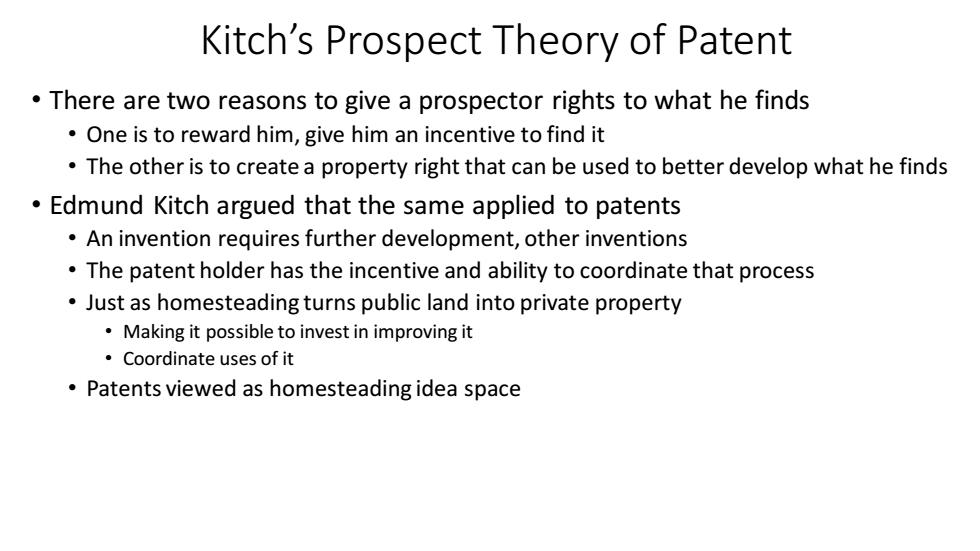
Kitch's Prospect Theory of Patent There are two reasons to give a prospector rights to what he finds One is to reward him,give him an incentive to find it The other is to create a property right that can be used to better develop what he finds Edmund Kitch argued that the same applied to patents An invention requires further development,other inventions The patent holder has the incentive and ability to coordinate that process Just as homesteading turns public land into private property Making it possible to invest in improving it ·Coordinate uses of it Patents viewed as homesteading idea space
Kitch’s Prospect Theory of Patent • There are two reasons to give a prospector rights to what he finds • One is to reward him, give him an incentive to find it • The other is to create a property right that can be used to better develop what he finds • Edmund Kitch argued that the same applied to patents • An invention requires further development, other inventions • The patent holder has the incentive and ability to coordinate that process • Just as homesteading turns public land into private property • Making it possible to invest in improving it • Coordinate uses of it • Patents viewed as homesteading idea space
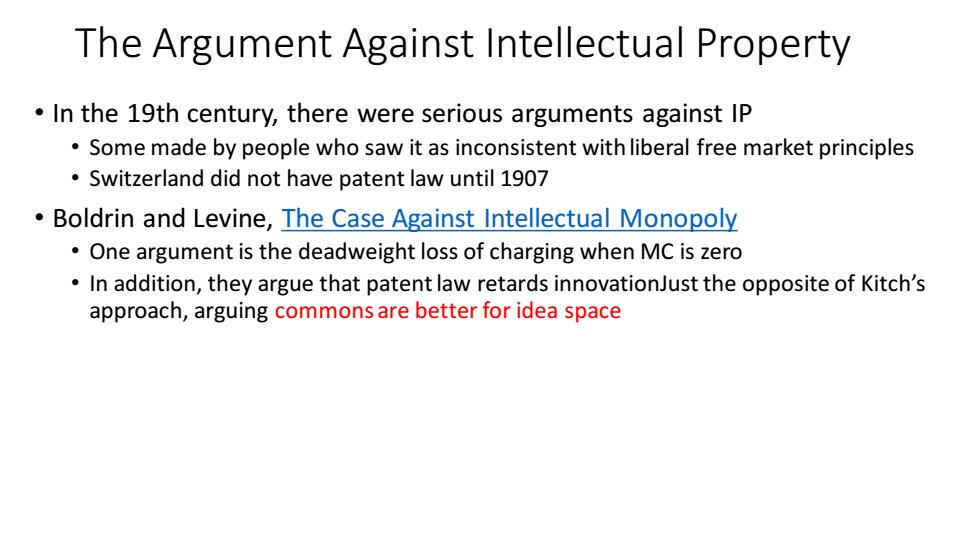
The Argument Against Intellectual Property In the 19th century,there were serious arguments against IP Some made by people who saw it as inconsistent with liberal free market principles Switzerland did not have patent law until 1907 Boldrin and Levine,The Case Against Intellectual Monopoly One argument is the deadweight loss of charging when MC is zero In addition,they argue that patent law retards innovationJust the opposite of Kitch's approach,arguing commons are better for idea space
The Argument Against Intellectual Property • In the 19th century, there were serious arguments against IP • Some made by people who saw it as inconsistent with liberal free market principles • Switzerland did not have patent law until 1907 • Boldrin and Levine, The Case Against Intellectual Monopoly • One argument is the deadweight loss of charging when MC is zero • In addition, they argue that patent law retards innovationJust the opposite of Kitch’s approach, arguing commons are better for idea space
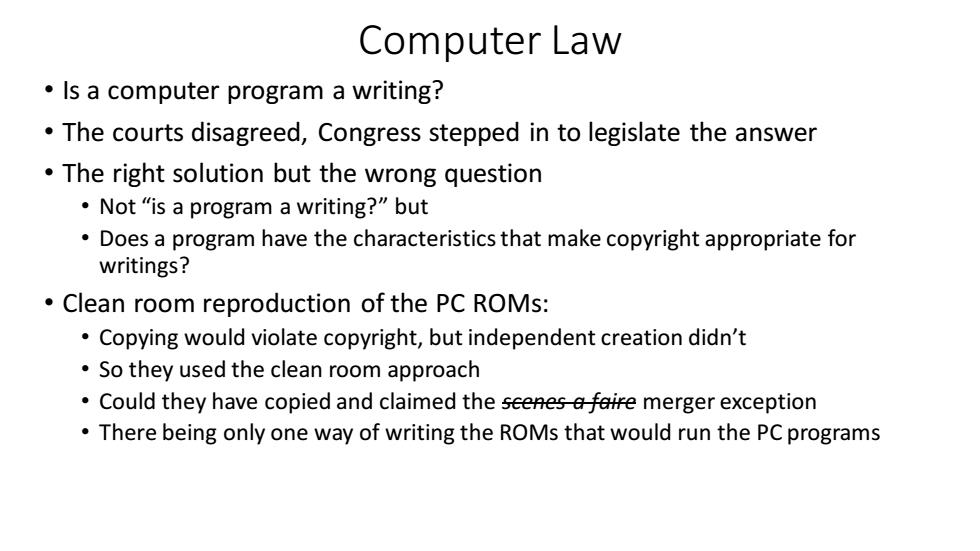
Computer Law Is a computer program a writing? The courts disagreed,Congress stepped in to legislate the answer The right solution but the wrong question ·Not“is a program a writing?"but Does a program have the characteristics that make copyright appropriate for writings? Clean room reproduction of the PC ROMs: Copying would violate copyright,but independent creation didn't So they used the clean room approach Could they have copied and claimed the scenes a faire merger exception There being only one way of writing the ROMs that would run the PC programs
Computer Law • Is a computer program a writing? • The courts disagreed, Congress stepped in to legislate the answer • The right solution but the wrong question • Not “is a program a writing?” but • Does a program have the characteristics that make copyright appropriate for writings? • Clean room reproduction of the PC ROMs: • Copying would violate copyright, but independent creation didn’t • So they used the clean room approach • Could they have copied and claimed the scenes a faire merger exception • There being only one way of writing the ROMs that would run the PC programs
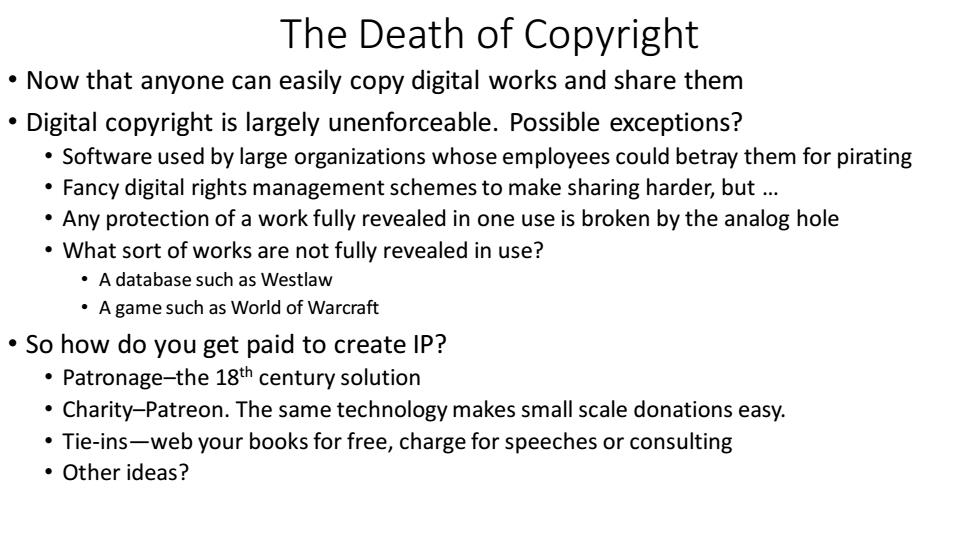
The Death of Copyright Now that anyone can easily copy digital works and share them Digital copyright is largely unenforceable.Possible exceptions? Software used by large organizations whose employees could betray them for pirating Fancy digital rights management schemes to make sharing harder,but .. Any protection of a work fully revealed in one use is broken by the analog hole What sort of works are not fully revealed in use? A database such as Westlaw A game such as World of Warcraft So how do you get paid to create IP? Patronage-the 18th century solution Charity-Patreon.The same technology makes small scale donations easy. Tie-ins-web your books for free,charge for speeches or consulting ·Other ideas?
The Death of Copyright • Now that anyone can easily copy digital works and share them • Digital copyright is largely unenforceable. Possible exceptions? • Software used by large organizations whose employees could betray them for pirating • Fancy digital rights management schemes to make sharing harder, but … • Any protection of a work fully revealed in one use is broken by the analog hole • What sort of works are not fully revealed in use? • A database such as Westlaw • A game such as World of Warcraft • So how do you get paid to create IP? • Patronage–the 18th century solution • Charity–Patreon. The same technology makes small scale donations easy. • Tie-ins—web your books for free, charge for speeches or consulting • Other ideas?
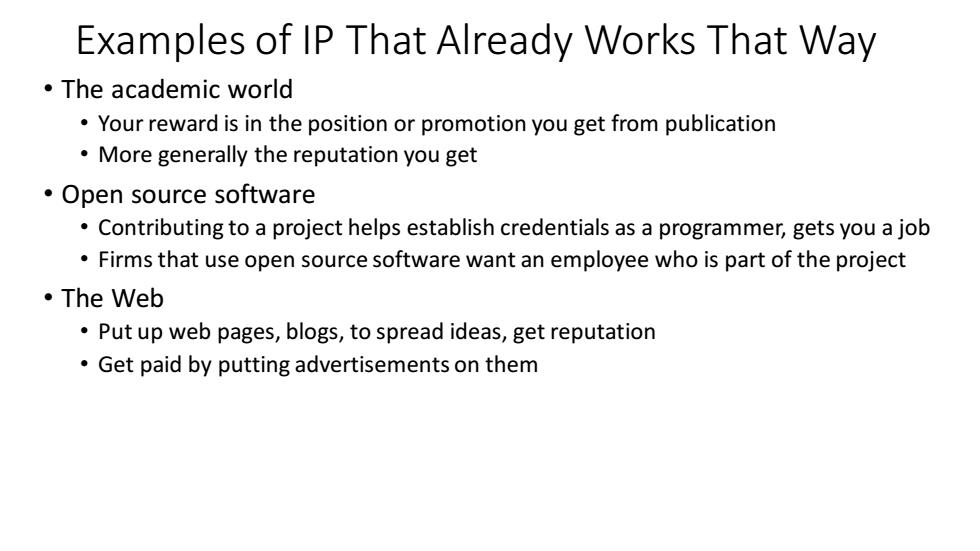
Examples of IP That Already Works That Way ·The academic world Your reward is in the position or promotion you get from publication More generally the reputation you get ·Open source software Contributing to a project helps establish credentials as a programmer,gets you a job Firms that use open source software want an employee who is part of the project ·The Web Put up web pages,blogs,to spread ideas,get reputation Get paid by putting advertisements on them
Examples of IP That Already Works That Way • The academic world • Your reward is in the position or promotion you get from publication • More generally the reputation you get • Open source software • Contributing to a project helps establish credentials as a programmer, gets you a job • Firms that use open source software want an employee who is part of the project • The Web • Put up web pages, blogs, to spread ideas, get reputation • Get paid by putting advertisements on them